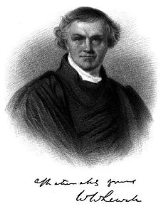
William Whewell
William Whewell was an English polymath, scientist, Anglican priest, philosopher, theologian and historian of science.
Sourced
- And so no force however great can stretch a cord however fine into an horizontal line which is accurately straight.
- Elementary Treatise on Mechanics, The Equilibrium of Forces on a Point (1819)
- We cannot observe external things without some degree of Thought; nor can we reflect upon our Thoughts, without being influenced in the course of our reflection by the Things which we have observed.
- The Elements of Morality, Book 1, ch. 1. (1845)
- Every failure is a step to success. Every detection of what is false directs us towards what is true: every trial exhausts some tempting form of error. Not only so; but scarcely any attempt is entirely a failure; scarcely any theory, the result of steady thought, is altogether false; no tempting form of Error is without some latent charm derived from Truth.
- Lectures on the History of Moral Philosophy in England, Lecture 7. (1852)
Philosophy of the Inductive Sciences (1840)
- According to the technical language of old writers, a thing and its qualities are described as subject and attributes; and thus a man’s faculties and acts are attributes of which he is the subject. The mind is the subject in which ideas inhere. Moreover, the man’s faculties and acts are employed upon external objects; and from objects all his sensations arise. Hence the part of a man’s knowledge which belongs to his own mind, is subjective: that which flows in upon him from the world external to him, is objective.
- Part 1, Book 1, ch. 2, sect. 7
- By speaking of space as an Idea, I intend to imply...that the apprehension of objects as existing in space, and of the relations of position, &c., prevailing among them, is not a consequence of experience, but a result of a peculiar constitution and activity of the mind, which is independent of all experience in its origin, though constantly combined with experience in its exercise.
- Part 1, Book 2, ch. 2, art. 1
- Our assent to the hypothesis implies that it is held to be true of all particular instances. That these cases belong to past or to future times, that they have or have not already occurred, makes no difference in the applicability of the rule to them. Because the rule prevails, it includes all cases.
- Part 2, Book 11, ch. 5, sect. 3, art. 10
- The system becomes more coherent as it is further extended. The elements which we require for explaining a new class of facts are already contained in our system. Different members of the theory run together, and we have thus a constant convergence to unity. In false theories, the contrary is the case.
- Part 2, Book 11, ch. 5, sect. 3, art. 12
- Man is the interpreter of nature, science the right interpretation.
- Aphorism 17
- In art, truth is a means to an end; in science, it is the only end.
- Aphorism 25
- The catastrophist constructs theories, the uniformitarian demolishes them.
- Aphorism 36
- It is a test of true theories not only to account for but to predict phenomena.
- Aphorism 39
